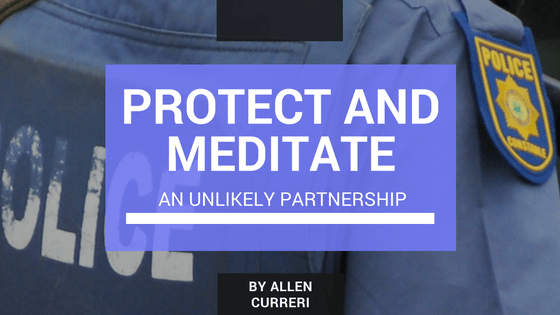It’s hard to imagine a traditional cop — full uniform, crewcut, handcuffs snapped in and a firearm on the hip — sitting cross legged on a yoga mat to the sound of a gong. And yet, that’s precisely what more and more police officers have been doing in satellite programs across America and in the UK.
That’s right: the latest, cutting edge police training is not in target practice or defensive strategy, but mindfulness.
Police have long held some of the most stressful, challenging, and high-stakes positions imaginable. An officer may begin their day by talking a teenager down from a ledge, or delivering the grim news and comforting a grief-stricken mother when they arrive too late, and finish that same day by being shot at. These moments of high intensity are punctuated by long strings of boredom and mind-numbing repetition, and yet they are constantly on call for emotionally taxing and life-threatening, adrenaline pumping moments.
It isn’t just cops who suffer, either. National events have recently begun to call attention to dangerous and often disastrous use of excessive force that poses a serious threat to anyone and everyone who counts on police to keep them safe — to protect and serve.
The root causes for this kind of violence and inappropriate lashing out are myriad and dizzyingly complex, just as the solutions are. Racial biases certainly seem to play a deep and disturbing role. One thing is for sure, though: police face near-constant high pressure situations in which they must make split-second decisions that alter lives forever. And this is a herculean task for which current traditional training does not adequately prepare the officers who face it.
The average police recruit spends almost 60 hours learning how to use their gun, but only eight hours on de-escalation strategies and less than an hour on stress management. A lack of attention on thoughtful, measured responses in training coupled with poor mental wellbeing from the stress of the job is a recipe for disaster no matter how you look at it.
The solution? Mindfulness. Pilot programs have launched teaching officers to tune into their own thoughts and pay thoughtful attention to the way they respond to and interact with their environment. A pilot study of mindfulness-based interventions reports significant improvements in mental health, anger, and emotional intelligence, to name a few.
The emotion regulating, de-stressing effects of meditation may also help cops to connect more meaningfully with their communities and approach the people they serve with greater empathy. The ultimate goal, as well as officer wellness, is improved emergency response. “Mindfulness opens up the space in which we make decisions—we’re not so linearly focused or so stressed because we are under threat,” says Oregon’s Officer Goerling, who has been a staunch advocate of the training. “I’m more aware of my options.”
He believes that mindfulness will prove to be valuable tactical training in situational awareness, giving cops the tools they need to make better decisions with shorter reaction times and act more judiciously when it comes down to the high-stakes, high-stress, adrenaline-filled moment that really matters.
It’s not an easy sell. Most officers view themselves as warriors, and the culture of the force has long been to suppress difficult emotions and soldier on, internalizing more and more stress which, in turn, makes them more vulnerable to emotional, biased decisions and errors in attention. Many of the cops in Goerling’s program were skeptical at best. They don’t see themselves as yogis, nor do they see value in focusing on their breath in the line of duty. They’ve come around, however, after experiencing the benefits first hand. A program leader in Manchester, Zoe Sheard, sums it up succinctly: “There’s nothing mystical in this – it’s just practical.”


